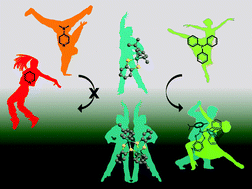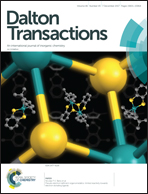Pseudo electron-deficient organometallics: limited reactivity towards electron-donating ligands†
Abstract
Half-sandwich metal complexes are of considerable interest in medicinal, material, and nanomaterial chemistry. The design of libraries of such complexes with particular reactivity and properties is therefore a major quest. Here, we report the unique and peculiar reactivity of eight apparently 16-electron half-sandwich metal (ruthenium, osmium, rhodium, and iridium) complexes based on benzene-1,2-dithiolato and 3,6-dichlorobenzene-1,2-dithiolato chelating ligands. These electron-deficient complexes do not react with electron-donor pyridine derivatives, even with the strong σ-donor 4-dimethylaminopyridine (DMAP) ligand. The Ru, Rh, and Ir complexes accept electrons from the triphenylphosphine ligand (σ-donor, π-acceptor), whilst the Os complexes were found to be the first examples of non-electron-acceptor electron-deficient metal complexes. We rationalised these unique properties by a combination of experimental techniques and DFT/TDFT calculations. The synthetic versatility offered by this family of complexes, the low reactivity at the metal center, and the facile functionalisation of the non-innocent benzene ligands is expected to allow the synthesis of libraries of pseudo electron-deficient half-sandwich complexes with unusual properties for a broad range of applications.



 Please wait while we load your content...
Please wait while we load your content...